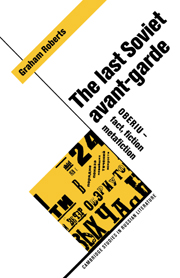Book contents
- Frontmatter
- Contents
- Acknowledgements
- Notes on transliteration and conventions
- Introduction: OBERIU – the last Soviet avant-garde
- 1 Authors and authority
- 2 Rereading reading
- 3 Language and representation
- Conclusion: OBERIU – between modernism and postmodernism?
- Notes
- Bibliography
- Index
- CAMBRIDGE STUDIES IN RUSSIAN LITERATURE
3 - Language and representation
Published online by Cambridge University Press: 02 September 2009
- Frontmatter
- Contents
- Acknowledgements
- Notes on transliteration and conventions
- Introduction: OBERIU – the last Soviet avant-garde
- 1 Authors and authority
- 2 Rereading reading
- 3 Language and representation
- Conclusion: OBERIU – between modernism and postmodernism?
- Notes
- Bibliography
- Index
- CAMBRIDGE STUDIES IN RUSSIAN LITERATURE
Summary
FROM REALISM TO ‘REAL’ ART: RUSSIAN MODERNISM AND THE AVANT-GARDE
In my first two chapters I have examined OBERIU metafiction from the point of view, first, of the writer, and second, of the reader. If writer and reader may be said to stand at opposite ends of the ‘horizontal’ axis of the text, then the focus of this chapter will shift to what might be described as the ‘vertical’ axis, namely the relationship between the text itself and the real world. The exact nature of that relationship – what Vaginov refers to in The Labours and Days of Svistonov as ‘the correlation between the imaginary and the real’ (‘sootnoshenie […] pridumannogo i real′nogo’; p. 211) – was a constant concern of Russian modernism and of the Soviet avant-garde alike. As we shall see, it was a question which also exercised the minds of the Oberiuty and their associates.
For many artists, interest in the nature of aesthetic representation amounted to an obsession with language, with the relationship between words and the world. The Symbolists, for example, believed that their words offered access to a higher, more authentic ‘reality’, A realibus ad realiora, to quote the title of a cycle of poems by Blok.
- Type
- Chapter
- Information
- The Last Soviet Avant-GardeOBERIU - Fact, Fiction, Metafiction, pp. 120 - 170Publisher: Cambridge University PressPrint publication year: 1997



